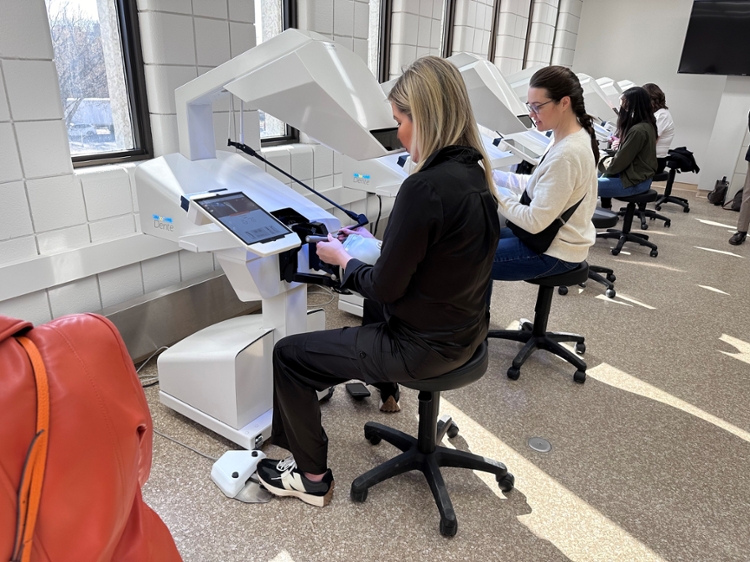
Dental Therapy: Improving Oral Health Access in Canada
A group of Dental Therapists were recently in Saskatoon for the Saskatchewan Dental Therapist Associations 50th Annual Dental Therapy Conference. As part of the conference, they visited the USask College of Dentistry for a tour of the college and took the opportunity to experience the new cutting-edge augmented reality simulators in the Mixed Reality Patient Learning Space.
By Duane KripWe sat down with three of the visiting dental therapists, Andrea Doiron, Floyd Prosper and Myra Daigneault to talk about the importance of dental therapists in Canada.
Background of dental therapy at USask
The University of Saskatchewan’s College of Dentistry in cooperation with Indigenous Services Canada (ISC) who provided $2.1 million in funding, launched a Bachelor of Science (BSc) in Dental Therapy program in the Fall 2023, thus establishing Canada’s first and only dental therapy degree program.
The program is run collaboratively through a partnership between the Northern Inter-Tribal Health Authority (NITHA), the University of Saskatchewan’s (USask) College of Dentistry, Saskatchewan Polytechnic, and Northlands College. In addition to the USask campus in Saskatoon, the program is facilitated through 3 off campus locations in La Ronge at the Northlands College campus, in Prince Albert at the USask campus, and in Regina at the Sask Polytech campus.
Dental therapy is a specialized area within the broader field of dentistry focused on providing preventive and basic restorative dental care. Dental therapists are trained and licensed to perform a range of services, including oral exams, cleanings, fillings, extractions, and limited restorative work on permanent teeth.
Who does dental therapy serve?
Andrea Doiron, a dental therapist with Indigenous Services Canada in Halifax, Nova Scotia explains, “Dental therapy primarily serves populations that face barriers to accessing traditional dental care”. In Canada, dental therapists play a critical role in providing care to Indigenous communities, particularly those in remote and rural areas. These communities often experience higher rates of dental disease and have limited access to dental services due to geographic isolation and systemic challenges. As Doiron explains, dental therapists remove barriers to care by bringing the services to their home community, saying, “It allows Indigenous patients to get the dental care they need without having to travel for their care”.
Dental therapists also emphasize preventive care, which is essential for reducing the prevalence of oral diseases. Early intervention and education can prevent more serious dental problems in the future, promoting overall health and well-being, “It’s a balance between prevention and restorative care.” States Doiron.
Dental therapists often work in schools and community settings, providing preventive care to children and adolescents. Floyd Prosper is a dental therapist who works in a K – 9 school in his home community of Eskasoni Mi’kmaw Nation, Cape Breton Island. He takes great pride in his role educating young people on proper oral hygiene practices and addressing dental issues at an early stage thus promoting better long-term oral health. He articulates, “When you work in a school, you have close a connection to the children. It allows you to be of service to help those vulnerable children.”
For dental therapists like Prosper, the profession gave him an opportunity to work in the community he grew up in. He articulates that when you become a dental therapist in your home community you are well-suited to provide care that respects the cultural beliefs and practices of the communities you serve.
He adds that in many communities, career opportunities may be limited. However, training as a dental therapist can open incredible array of opportunity both on and outside of your home community.
Why dental therapy is important in Canada?
The importance of dental therapy in Canada cannot be overstated. Dental therapists like Myra Daigneault who works out of Prince Albert, Saskatchewan sees the improved access to dental services for populations facing geographic or economic barriers as vital. Daigneault travels every day from Prince Albert out into the communities needing the dental services. She states, “It is important to travel out onto the communities otherwise kids may not get the care needed if individuals have to travel long distances for treatment”.
Dental therapy offers an effective solution to providing basic dental care. By focusing on prevention and early treatment, it helps reduce the burden on the healthcare system by addressing issues before they become more complex and costly.
For Daigneault, her career as a dental therapist is a rewarding one. “You notice the difference you can make when you give kids a good foundation for oral health. It feels good to help – it’s very gratifying” she explains.
Doiron, Prosper and Daigneault were trained at the former National School of Dental Therapy in Prince Albert which closed in 2011. All three welcome the new USask program. Doiron noted that the new BSc degree opens more opportunities to students for further education…especially for Indigenous people.
The USask College of Dentistry is committed to support and expand the role of dental therapists in Canada by graduating up to 28 dental therapists annually. Those graduates will play a crucial role in improving oral health outcomes and reducing disparities in access to dental care across Canada.
By expanding access to essential dental services, focusing on prevention, and addressing the unique needs of underserved populations, dental therapy will continue to contribute to the overall health and well-being of Indigenous communities nationwide.

